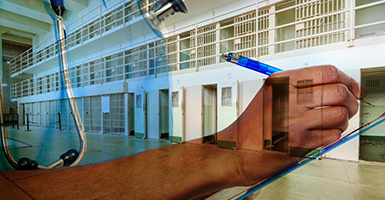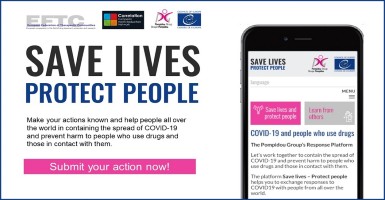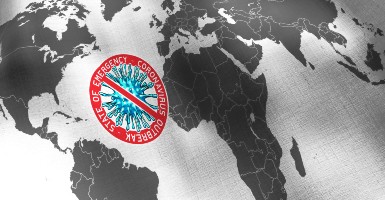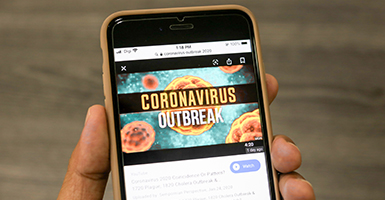The impact of COVID-19 on human rights and the rule of law - Our action


Bookmark this webpage
COVID-19 Human Rights
and Rule of Law
See also
- Intervention by Christos Giakoumopoulos, Director General Human Rights Rule of Law (en français)
- Council of Europe COVID-19
Read | Watch | Share | Follow
Read by topic

Right to protection of health
The COVID-19 crisis is a brutal reminder of the importance of ensuring lasting progress with respect to social rights enjoyment, particularly through the development of universal public health services. The pandemic shows in practical terms the indivisibility of human rights. It is crucial that the European Social Charter, also known as the Social Constitution of Europe, is used to shape human rights-compliant responses to the COVID-19 pandemic and to take stock once the crisis is over. The Charter, together with its monitoring mechanisms—reporting and collective complaints—are excellent tools for the reconstruction efforts that will follow.

Human rights and biomedicine
Major ethical challenges are raised and difficult decisions are being taken in the pandemic crisis. It is essential that human dignity and human rights are upheld The Oviedo Convention provides a unique international legal framework for states to use when taking important decisions in this context, which includes the principle of equitable access to health care (Article 3), guided by medical criteria, to prevent increased vulnerabilities and to avoid discrimination. Together with consent, protection of privacy and the other principles of the Convention, it reaffirms the fundamental link between human rights, solidarity and responsibility, essential in addressing the current crisis.

Countering falsified medicines
Counterfeit medical products deny patients proper medical treatment and are harmful to their health. The current health crisis has dramatically exacerbated this phenomenon.
The Council of Europe MEDICRIME Convention is a key text to counter counterfeit medical products.

Torture prevention
On 20 March, the European Committee for the Prevention of Torture and Inhuman or Degrading Treatment or Punishment (CPT) published a Statement of Principles relating to the treatment of persons deprived of their liberty in various places of detention (including psychiatric hospitals, social care homes and newly-established quarantine facilities/zones) in the context of the COVID-19 pandemic. The text reminds State authorities of the absolute nature of the prohibition of torture and inhuman or degrading treatment and stresses that protective measures must never result in inhuman or degrading treatment of persons deprived of their liberty.

Health in prison and Support to prison system
COVID-19 poses a specific risk to persons deprived of their liberty and to those who are in daily contact with them. Several Council of Europe texts are relevant to mitigate these risks, including the European Prison Rules and Committee of Ministers’ Recommendations n° R(93)6 and R (98) 7. Two handbooks aiming to improve prison healthcare and medical ethics, and the organisation and management of healthcare in prisons, may serve as guidance for member states in the current context. Additionally, in response to the need of providing urgent support to inmates and prison staff, protective materials are donated to several member States through the organisation’s cooperation activities.

Platform "Save lives - Protect people"
The Pompidou Group Secretariat has developed an online platform to share experiences in meeting the practical challenges resulting from the current pandemic. The platform constitutes a tool for decision makers and practitioners and offers on-line examples of practices that are aimed at mitigating the adverse effects of the COVID-19 crisis and associated restrictions for the people who use drugs as well as those who are in contact with them.
The Secretariat actively searches for documentation on existing practices on an ongoing basis. Governmental bodies, service providers, experts, civil society organisations, as well as individuals providing lived experience can contribute to the platform.

Emergency powers - what standards?
In times of pandemic crisis, national governments are taking exceptional measures to slow down the spread of the virus. On numerous occasions, the Venice Commission has examined the limits of emergency powers. The Commission has consistently underlined that State security and public safety can only be effectively guaranteed in a democracy which fully respects the rule of law. Even in genuine cases of emergency situations, the rule of law must prevail.

Efficiency of Justice
During the current pandemic, member States had to adapt to new circumstances. A compilation of measures was made by the European Commission for the Efficiency of Justice (CEPEJ) at the beginning of the health crisis and is regularly updated. To guide States, the CEPEJ organised a meeting on 10 June 2020, in the framework of the Greek Chairmanship of the Committee of Ministers, on the impact and lessons of the COVID19 crisis as regards the efficiency of justice and the functioning of the judiciary, which led to the adoption of the "Declaration on lessons learnt and challenges faced by the judiciary during and after the COVID19 pandemic".

Combatting corruption and money laundering in the health sector
Bribery in the health care sector makes medical services more expensive and of a lower quality, and undermines patients' trust in the health services. In addition it distorts competition and has serious financial consequences for public health care insurers, and thus for the state budget. The Council of Europe Criminal and Civil Law Conventions on corruption are particularly relevant in this context and should be ratified and effectively implemented. In addition, the Council of Europe National AML/CFT Risk Assessment Methodology offers a unique tool to mitigate the money laundering risks linked to corruption in the health sector. See GRECO and MONEYVAL

Legal Co-operation
The context of COVID-19 is particularly conducive to an increased volume of virtual transactions between traders and individuals as well as between businesses. From such transactions will inevitably arise disputes and proceedings, notably in relation to electronic evidence, that courts will have to manage. The Guidelines on the use of electronic evidence in such proceedings offer national courts invaluable guidance in this respect.
Role of prosecutors and prosecution services
The COVID-19 pandemic has far-reaching implications for prosecution services across Europe, which need to confront the pandemic’s challenges and play a leading role as defenders and guardians of the rule of law. How to keep up the highest standards of quality? How to make sure that the new legal measures under a public health emergency are used to protect people with strict respect for human rights obligations? The Consultative Council of European Prosecutors (CCPE) is addressing these in its Opinion No. 15 (2020) on the role of prosecutors in emergency situations, in particular when facing a pandemic, building on the experience of the CCPE members who are all practicing prosecutors.
Independent, impartial and effective judiciary
The Consultative Council of European Judges (CCJE), through its Chair’s Statement on the role of judges during and in the aftermath of the COVID-19 pandemic takes stock of how this unprecedented situation poses special threats and challenges to the justice systems, to their effectiveness and independence. Based on its practical experience as a unique body consisting of judges in office, it highlights judges’ role in responding effectively to such crisis in full respect for human rights, and above all, for the European Convention on Human Rights. Just as in normal conditions, the independence and impartiality of judges remain an axiom at the time of a pandemic, a sine qua non of democratic state and a strong rule of law.

Data Protection
The current fight against the pandemic may require measures that restrict our human rights and fundamental freedoms, including the right to Data Protection. In this respect, it is important to recall that data protection can in no manner be an obstacle to saving lives and that the applicable principles always allow for a balancing of the interests at stake.

Cybercrime
The pandemic renders individuals and society extremely vulnerable in all respects, including in cyberspace. Malicious actors are exploiting these vulnerabilities. Criminal justice authorities need to engage in full cooperation to detect, investigate, attribute and prosecute COVID-19 related offences and bring criminals to justice.
With the Budapest Convention, a framework for effective cooperation with the necessary rule of law safeguards, is available to 65 States. As a result of capacity building programmes, including a recently launched series of webinars and an online resource, many States should now be able to act.

Challenges to freedom of expression and its corollary media freedom
As governments around the world are declaring a state of emergency in response to the COVID-19 outbreak, it is of crucial importance to ensure that any exceptional measures introduced do not undermine freedom of expression (Article 10) and other human rights enshrined in the Convention and are “strictly required by the exigencies of the situation” (Article 15)

Artificial Intelligence
Digital technologies, including Artificial Intelligence (AI), have been used to support the fight against the current pandemic affecting the entire world since the beginning of 2020. AI has been particularly implicated in the search for a treatment and a vaccine, as well as in the accelerated development of testing methods.

Audiovisual
The health crisis is producing unprecedented challenges for the audiovisual sector.
In response to this, governments and industry bodies are bringing in measures to support the various industries and their professionals through this period. And we're now tracking them for you. You’ll find a freely downloadable EXCEL table, updated on a daily basis. We emphasise that this is an on-going research project and should be understood as work in progress.
Marija Pejčinović Burić
Secretary General
High-level plenary session, SPBILF 2020
Christos Giakoumopoulos
Director General Human Rights and Rule of Law
Online debate "Human rights under quarantine", SPBILF 2020
Jan Kleijssen
Director Information Society - Action against Crime
Online debate "Human rights under quarantine", SPBILF 2020












